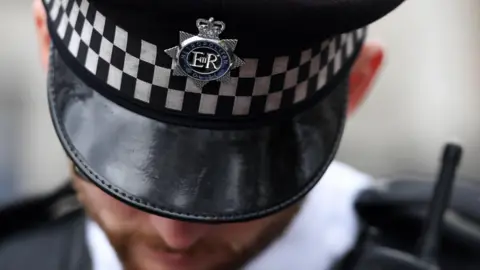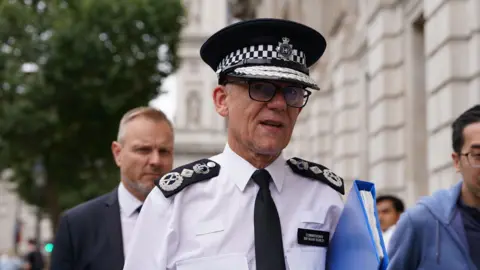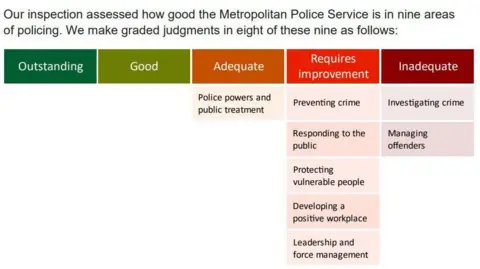 EPA
EPAThe Metropolitan Police is failing in almost every area of its work, the police inspectorate has said.
The force was assessed in nine areas and classified as “requires improvement” or “inadequate” in seven – including crime investigation and prevention.
HM Constabulary Inspector Lee Freeman said many changes had been made but had not produced “consistent improvements”.
The Met said it was “using all available resources to deliver confidence, low crime and high standards”.
Inspectorate of Constabulary and Fire & Rescue Services (HMICFRS) force review for the period 2023-25.
Mr Freeman highlighted:
- The Met is “inconsistent” in managing sex offenders, with a backlog of visits and risk assessments in some teams
- More needs to be done to ensure that it “consistently assesses the level of risk” for all 999 and 101 calls when considering responses.
- The force “has not yet achieved its goal of reducing the outstanding number of suspects”
- There are “significant problems in investigative standards, victim care and investigation management” in the Met’s victim service, and “some offenses involving vulnerable people are not being investigated by trained investigators”
 PA Media
PA MediaMr Freeman said the Met was undergoing a “significant” transformation, and “many changes have been made”, but “this has not translated into consistent and sustained improvement in certain key areas”.
“As a result, I have serious concerns about how the force currently investigates crimes and manages offenders and suspects,” he said.
“I also have concerns about how the force prevents and reduces crime and provides effective services to victims.”
Other findings include problems arising from a lack of training for investigating officers, including managing suspects and sex offenders, and inexperienced officers “trying to manage a workload that is beyond their training and knowledge”.
It said the Met told the inspectorate that nearly one in five (18%) visits to sex offenders were delayed.
“The force’s culture has made some officers and staff reluctant to speak up about bad behaviour”, the report added.
Concerns have also been raised about the Met’s proposal to scale back reform plans due to a £92m funding gap for 2024-25.
“This presents a significant risk to the ability and capacity of the force to implement the necessary improvements,” the inspectorate said.
However, HMICFRS praised the use of force for stops and searches, saying it was “fair and effective” and that “the majority of recorded stops and searches were reasonable”.
 HMICFRS
HMICFRSMr Freeman told BBC Radio London that he believed the force was “disappointed” with some of the gradations, adding things were “a work in progress”.
“I think the public needs to be confident that the force knows what the problem is, that they have a plan to deal with it – but of course the next stage now is to consistently deliver,” he said.
He added “more needs to be done” to ensure the impact of the many changes “starts to be seen and felt consistently by victims and communities across London”.
A Met spokesman said the force was using “every resource available to deliver confidence, low crime and high standards for London” and the report “underlines why these ongoing reforms are needed”.
“We are now carefully reflecting on these findings, which in essence reflect our ‘A New Met for London’ plan and the brief we have given to HMIC,” he said.
The Mayor of London, Sadiq Khan, said he welcomed the report and agreed with its findings, but said he was “confident” commissioner Sir Mark Rowley could “turn this around”.
“We’ve got a long way to go, but we’re moving in the right direction,” he said.





